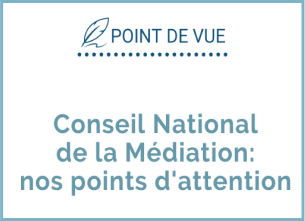“The average duration of a legal dispute in France (including the appeal period) lasts between 2 and 3 years and almost 5 years with an appeal to the French Court of Cassation.” (Source: Ministry of Justice, key judicial figures for 2021)
Through this support, the CMAP encourages the development of the use of ADRM, a genuine factor in the competitiveness of companies. Companies are meant to win market shares, not lawsuits!

30 years of experience in the field of ADRM
a large panel of experienced and certified mediators and arbitrators
Transparent schedules to anticipate costs
a team of legal experts dedicated to listening to companies, lawyers and magistrates
Rules governing the organisation of mediation and arbitration
We take care of the logistics of the procedures
Rooms made available for mediation meetings and arbitration hearings





Created in 1995 by the Paris Chamber of Commerce and Industryas an association under the law of 1901, CMAP is today the leader in France and one of the main European centers for the management and resolution of commercial disputes.
It is also a recognized training organization.
Come and discover who we are in video.
Mediation is an amicable and confidential process for resolving disputes.
Its objective: to propose to the parties in conflict the intervention of an independent and impartial third party trained in mediation, which helps them to reach an optimal negotiated solution and, in any case, in accordance with their respective interests, ending the dispute.
The mediator is neither a judge nor an arbitrator,but rather a “catalyst” whose mission is to facilitate negotiations between the parties in order to help them find a solution to their dispute themselves.
More information .
Arbitration is a private jurisdictional method of conflict resolution, regulated in articles 1442 and following of the Code of Civil Procedure (CPC).
It consists in submitting, by contract, a dispute born or to be born between one or several natural or legal persons to the jurisdiction of a third party, the arbitrator or the arbitral tribunal (when several arbitrators are involved), which is independent and impartial, and which is responsible for settling the said dispute in accordance with the applicable rules of law and commercial practice. The arbitrator then makes a decision, called an arbitration award, which is binding on the parties and ends the dispute.
More information.
Amicable expertise consists in taking the opinion of a third party to decide on a technical or legal question.
CMAP offers two amicable expertise procedures, depending on whether the finding concerns a factual or legal situation.
Learnmore.
The occurrence of conflicts in business is a statistical certainty.
Prevention then become a major asset in terms of efficiency and competitiveness.
CMAP has developed specific expertise in the field of conflict prevention. Our offer covers a very broad spectrum of situations in the fields of commercial relations and employment law, both from the point of view of training and the drafting of clauses.
Learn more.

Tant notre client dont j’étais en charge des intérêts que mon Cabinet avons été pleinement satisfaits de la mise en place de la mesure de médiation. Le travail effectué par le médiateur a été remarquable.

Je tiens à remercier très sincèrement le médiateur pour la disponibilité, la réactivité et le professionnalisme avec lequel il est intervenu et me félicite une fois de plus d’avoir eu recours au CMAP dont l’intervention a permis une solution constructive et rapide dans un dossier extrêmement conflictuel

Nous (…) vous remercions pour votre intervention dans ce dossier. Nul doute que votre expertise a largement contribué à mettre un terme à ce différend.

A l’occasion de sa dernière Assemblée Générale, le CMAP (Centre de Médiation et d’Arbitrage de PARIS) a publié son baromètre annuel de la Médiation et de l’Arbitrage. […]

Interview de Christophe AYELA, Avocat au Barreau de PARIS (STAS & ASSOCIES), Médiateur agréé CMAP. […]

A l’occasion de sa dernière Assemblée Générale, le CMAP (Centre de Médiation et d’Arbitrage de PARIS) a publié son baromètre annuel de la Médiation et de l’Arbitrage. […]
The CMAP has been relying on a team of lawyers and advisers since its creation in 1995. It thus offers high quality services, within short deadlines and with support that combines confidentiality and efficiency.
The proceedings are supervised by our committees, which guarantee their professionalism and independence.
Alternative dispute resolution is an out-of-court process as opposed to traditional dispute resolution, which involves bringing the dispute before a state judge.
No, either party can freely terminate the process at any time.
Mediation and conciliation refer to the process of conflict resolution in which two or more parties attempt to reach an amicable agreement with the help of a third party.
There are few differences between mediation and conventional conciliation.
On the other hand, mediation and judicial conciliation are governed by different legislation.
Article 21 of the CPC provides that “it is part of the judge’s mission to reconcile the parties”.
Judicial conciliation is therefore implemented by the judge himself or by a court conciliator to whom he has delegated his conciliation mission.
On the other hand, judicial mediation is entrusted to a mediator, a third party external to the court, as provided for in article 131-1 of the CPC, which stipulates that the judge, when seized of a dispute, may designate him or her with the agreement of the parties. Conciliation is free for the parties and mediation is a paid service.